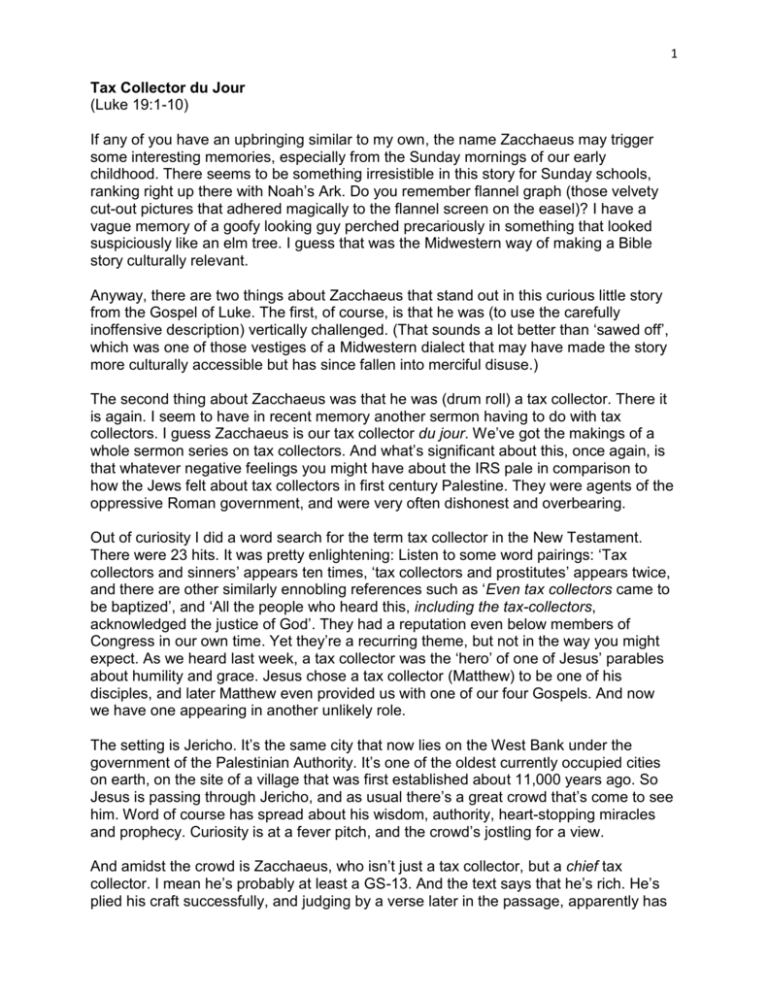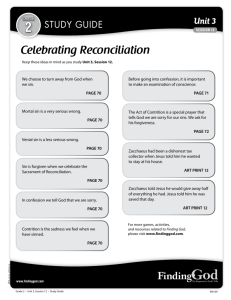yr_c_proper_26_13
advertisement

1 Tax Collector du Jour (Luke 19:1-10) If any of you have an upbringing similar to my own, the name Zacchaeus may trigger some interesting memories, especially from the Sunday mornings of our early childhood. There seems to be something irresistible in this story for Sunday schools, ranking right up there with Noah’s Ark. Do you remember flannel graph (those velvety cut-out pictures that adhered magically to the flannel screen on the easel)? I have a vague memory of a goofy looking guy perched precariously in something that looked suspiciously like an elm tree. I guess that was the Midwestern way of making a Bible story culturally relevant. Anyway, there are two things about Zacchaeus that stand out in this curious little story from the Gospel of Luke. The first, of course, is that he was (to use the carefully inoffensive description) vertically challenged. (That sounds a lot better than ‘sawed off’, which was one of those vestiges of a Midwestern dialect that may have made the story more culturally accessible but has since fallen into merciful disuse.) The second thing about Zacchaeus was that he was (drum roll) a tax collector. There it is again. I seem to have in recent memory another sermon having to do with tax collectors. I guess Zacchaeus is our tax collector du jour. We’ve got the makings of a whole sermon series on tax collectors. And what’s significant about this, once again, is that whatever negative feelings you might have about the IRS pale in comparison to how the Jews felt about tax collectors in first century Palestine. They were agents of the oppressive Roman government, and were very often dishonest and overbearing. Out of curiosity I did a word search for the term tax collector in the New Testament. There were 23 hits. It was pretty enlightening: Listen to some word pairings: ‘Tax collectors and sinners’ appears ten times, ‘tax collectors and prostitutes’ appears twice, and there are other similarly ennobling references such as ‘Even tax collectors came to be baptized’, and ‘All the people who heard this, including the tax-collectors, acknowledged the justice of God’. They had a reputation even below members of Congress in our own time. Yet they’re a recurring theme, but not in the way you might expect. As we heard last week, a tax collector was the ‘hero’ of one of Jesus’ parables about humility and grace. Jesus chose a tax collector (Matthew) to be one of his disciples, and later Matthew even provided us with one of our four Gospels. And now we have one appearing in another unlikely role. The setting is Jericho. It’s the same city that now lies on the West Bank under the government of the Palestinian Authority. It’s one of the oldest currently occupied cities on earth, on the site of a village that was first established about 11,000 years ago. So Jesus is passing through Jericho, and as usual there’s a great crowd that’s come to see him. Word of course has spread about his wisdom, authority, heart-stopping miracles and prophecy. Curiosity is at a fever pitch, and the crowd’s jostling for a view. And amidst the crowd is Zacchaeus, who isn’t just a tax collector, but a chief tax collector. I mean he’s probably at least a GS-13. And the text says that he’s rich. He’s plied his craft successfully, and judging by a verse later in the passage, apparently has 2 defrauded no small number of taxpayers. There can be absolutely no question that he’s a notorious sinner and a despised man. I can easily imagine the looks, and the muttering, and the thinly concealed snarls as he weaves his way through the crowd. Because frankly, he can be accurately described as an agent of injustice. But here he is, curious, and in some inexplicable way magnetically drawn to this increasingly famous prophet. He sees the direction Jesus is going, quickly calculates where he might be able to get a close up view, spots the sycamore tree, and up he goes. Jesus makes his way up the street and looking up into the tree, he says, ‘Zacchaeus come down right away, because it’s your house I’m coming to.’ Can you imagine this? Zacchaeus is up there clinging to a branch, perhaps swaying slightly in the breeze, and Jesus looks up and says he’s coming over to his house. (‘Oh man, I knew I should have swept the floor.’) But the text nevertheless says that he’s happy to play host to Jesus, so he climbs down without delay. And the text also says that those close by, just like the older brother of the prodigal son and just like the Pharisees, begin to grumble. ‘Look at that! He’s gone to be a guest of a sinner! So much for being a holy man.’ I can picture the dismissive hand waves and snorts as they begin making their way back home. Now, there’s something that needs to be acknowledged about people who sacrifice ethics for wealth. And that is that they’re very often unpopular people, and are therefore very likely to be lonely and love-starved. I’m sure the reaction of the crowd to Jesus’ self-invitation wasn’t lost on Zacchaeus. Hurtful barbs were undoubtedly hurled in his direction as well. But here’s Jesus, this great and popular man, looking at him with a striking blend of authority and irresistible kindness, and saying in effect, ‘I want to spend some special time with you personally. I’m not afraid of visiting your house. Let’s go have a cup of coffee there.’ Is it any wonder that right at that moment, Zacchaeus’ world is shaken? Here’s what the text says: ‘Zacchaeus stood there and said to the Lord, ‘Look, half of my possessions, Lord, I’ll give to the poor; and if I have defrauded anyone of anything, I’ll pay back four times as much.’ Then Jesus said to him, ‘Today salvation has come to this house, because he too is a son of Abraham. For the Son of Man came to seek out and to save the lost.’ One of the joys of writing sermons based on our lectionary is that just about every time I look at a passage something new hits me. What struck me this time is the roles that both Jesus and Zacchaeus play in developing a relationship, and how very aptly the lessons of this story apply to us. We’re in the very unique position of both developing a relationship with Christ, and endeavoring to be Christ to other people, that is, to develop Christ-like friendships with them. Both of these points are made in this passage. The first point is one that convicted me of some of my own attitudes. In this narrative, it’s not only that Jesus encounters an unpopular man by befriending him; he’s actually meeting someone who we all would agree is a destructively unjust man. Now think on this with me. How do we do when we encounter someone who’s exploiting or defrauding others? I know what I do. I react with anger. My gut level reaction is to make 3 no effort whatsoever to think about what may have propelled someone to be a perpetrator of injustice or how the consequences of their behavior may be causing them profound sadness and loneliness. I want justice done in my own way, and pronto. Now, please don’t get me wrong, the Holy Trinity is into justice. There are consequences for our actions. In fact it’s the whole divinely designed, universal reality of justice that required that a saving sacrifice be made on our behalf. God’s into justice. But let’s look at what Jesus, this sacrifice-to-be, does. He doesn’t read Zacchaeus out and warn him of impending judgment. He doesn’t just patiently tolerate his presence; he seeks him out in order to invite him to break bread together. Nineteenth century poet Francis Thompson wrote a poem called ‘The Hound of Heaven’, which was reportedly a big influence on J. R. R. Tolkien. It’s about the Lord not passively waiting for us to seek him, but pursuing us with His grace. This is exactly what Jesus is doing here. He knows Zacchaeus’ heart—the good, the bad and the ugly. And Zacchaeus’ life has listed notably in the direction of the latter two—the bad and the ugly. Yet Jesus seeks him out and invites him. Well, you probably know what’s coming next. If we’re called upon to be Christ-like, how are we responding to aggressive sinners, to perpetrators of injustice? Are we desiring that fire rains down from the sky, or do we decide to show compassion and invite them to the table of grace and friendship? OK? Think atheists. Or liberals. Or conservatives. Anyone that any of us might see as an antagonist. How are we being Christ to them? Just asking. It’s no small or easy thing to ask, ‘Lord, please let me see this person through your eyes.’ But the other lesson in this passage is the one that Zacchaeus the tax collector offers to us. The first thing he does when Jesus draws near is simply to respond. He could have curled his lip and chided his gullible countrymen for falling for the latest would-be Messiah. He could have rolled his eyes and gone home to re-count his money. But instead, responding to the hunger in his own heart, he places himself within range of the Hound of Heaven. He becomes a seeker. And then when Jesus talks to him and invites him, he humbles himself, he makes himself vulnerable enough to experience joy, trust and hope, and gratefully accepts Jesus’ invitation. Here’s the thing: Zacchaeus knows for his part what to do to reciprocate Jesus’ overture. He instinctively recognizes someone he can trust. But there’s something even deeper here. I’m guessing that He also intuitively knows that this man represents truth. In fact, Jesus somehow just may embody—just may be the truth. And this combination of truth and grace—not browbeating and condemnation—is what compels Zacchaeus to make amends for his past actions. ‘Lord, I will give to the poor; and if I’ve defrauded anyone, I will pay back four times as much.’ That’s the package: the offering of grace, then the acceptance of grace and the amendment of life. The text doesn’t tell us anything about the time they spent at Zacchaeus’ house. I’d give lot to have been a fly on the wall in his kitchen. Nor do we have any idea whether their paths crossed at any time after that meeting. But when you look at this from the perspective of relationship, I humbly offer that it’s important for us to recognize that 4 responding to Jesus’ offer of grace isn’t simply a matter of accepting it, then joyfully walking away and saying, ‘Well, that’s done!’ Because with his offer of grace comes an offer of relationship—an offer of friendship, and friendships need to be cultivated every day. Jesus has come from heaven to earth not only to atone for our sins, but to offer real, here-and-now relationship with him, and with the Father, and with the Holy Spirit. He wants us to know each other so well and love each other so much that, when we cross over to the other side, we’re eager to fall into the familiar arms of grateful and godly friendship. I have to admit, this kind of talk used to creep me out a little. ‘OK, so how do I cultivate a deep relationship with someone I can’t see? Do I just kind of make it up or play-act until it feels real? Kind of like a kid with an invisible friend?’ Well, this is one of those things for which I think the best explanation is that you can’t learn how to swim without getting into the water. In other words, there’s no shortcut for putting relationship into practice. And what’s the universal feature of all relationship? Communication! We simply talk with the Lord, and for that matter, ask for a more personal relationship; then we really start paying close attention. This is called prayer. Prayer is conversation with the Lord. We may not hear an audible voice in response, but may well experience either happenings or feelings that assure us of his presence. And the more we do this, the more familiar the signs of His presence become, and over time, the more we’re able to trust and know it’s Him. And of course the other thing that helps us to know Jesus better and better is to read the scriptures every day. We begin to internalize in our hearts the cadence and content of Jesus’ own words, and spiritually respond to his grace and love by reading and meditating on his acts. Just those two things—reading the Bible, especially the Gospels, and having conversations with the Lord—will bring us into a closer relationship with Him. It’s not a big mystery, but it does require some level of initiative, or at least, a willing and ongoing response, on our part. So, there it is: two simple lessons from the Zacchaeus story. My prayer is that we crane our necks to look for Jesus in our everyday lives—watch for his appearing!—climbing the nearest sycamore tree if necessary, and respond to the invitation he makes daily in each of our hearts. It’s a daily thing! And, at the same time, may he give us the wisdom and grace to see others through his eyes, that we may create a place at the table for each love-starved person with whom our life journeys intersect. Amen.










